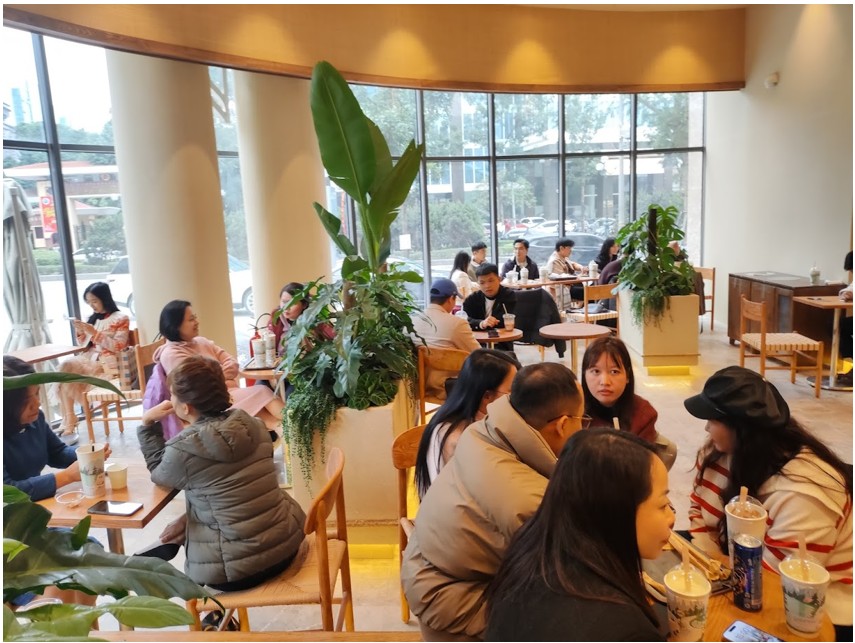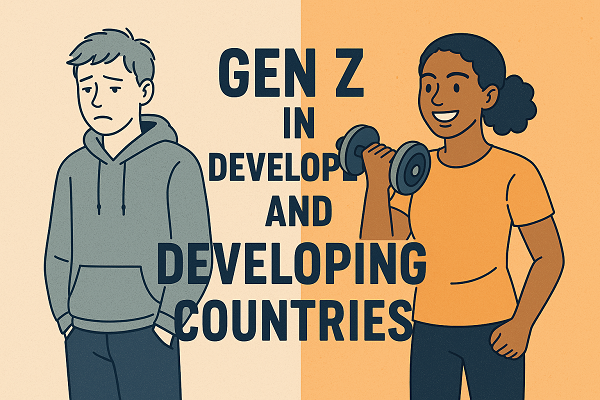Data Reveals Generation Z Across 10 Countries: What Are the Values of the Youth Shaping the World? ~ Unraveling Generation Z Lifestyles Through Country Comparisons ~
- Release date: Sep 30, 2025
- Update date: Sep 30, 2025
- 6213 Views
Digital natives and the SNS generation. They prioritize time efficiency and cost performance, have low material desires, and value “being themselves”—these are well-known characteristics of Japan's Generation Z.
But do these traits hold true overseas? And are we truly capturing Generation Z's values and lifestyles accurately through data?
This article unravels the true nature of Generation Z through data, based on a seminar held on June 17, 2025, and drawing from a large-scale survey spanning 10 Asian countries, 280,000 respondents, and 404 items.
目次
1.What exactly is Generation Z?
2. Generation Z Values
(1) What kind of life do you want to live?
(2)Would you rather live fully in the present than worry about the future?
(3) What are your values regarding material possessions?
(4) Prioritizing one's own thoughts versus others' thoughts
(5) Generation Z Values (Country Comparison)
3. Generation Z's Awareness of Their Surroundings
(1) My financial situation one year from now
(2) Your Approach to Your Own Health
(3) Environmental Philosophy
(4) Approach to Shopping
(5) Comparison of Generation Z and Generation Y
4. Summary
1.What exactly is Generation Z?
The term “Generation Z” originates from “Gen X,” which gained popularity following the 1991 publication of the novel Generation X. Subsequently, the generation following “Gen X” became known as “Generation Y,” and the generation after that as “Generation Z.”
While this “Gen X, Y, Z” classification became widely used in English-speaking countries, including the United States, Japan typically uses age groupings based on 10-year intervals.
For this seminar, generations were defined as follows:
・Generation Z (Gen Z): Born between 1996 and 2010. Aged 15 to 29 as of 2025
※However, for seminar data, only those aged 18 to 29 (excluding minors) were included in the analysis
・Generation Y (Gen Y): Aged 30 to 49
・Generation X (Gen X): Aged 50 to 64
Generation Z is projected to account for one-quarter of the world's population by 2030, five years from now, and their total consumption is expected to increase by 47%.
Understanding Generation Z's values will be crucial for grasping this market, which is set to expand even further.
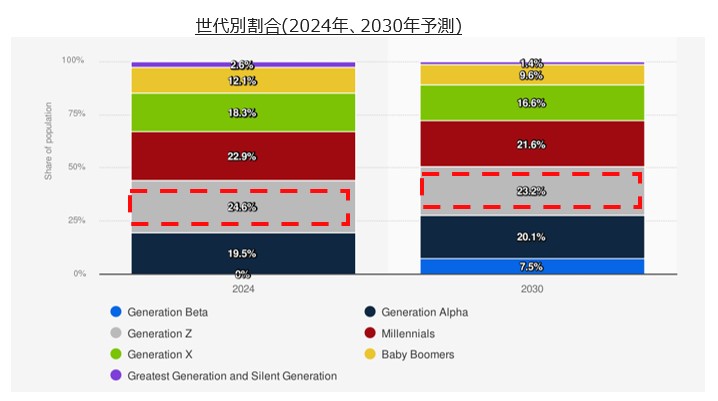
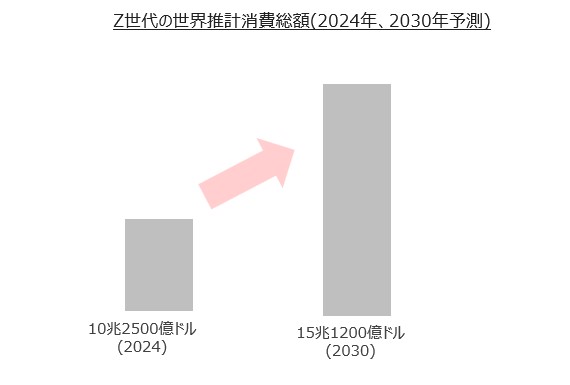
*1 https://www.statista.com/statistics/1607121/estimated-population-of-the-world-by-generation/
*2 Source: The Nikkei (March 13, 2025)
https://www.nikkei.com/article/DGKKZO87294120S5A310C2TB2000/
2. Generation Z Values
First, we explore the values held by Generation Z across 10 countries. We examine the underlying criteria guiding their daily decisions from four perspectives: “Stability vs. Excitement,” “Future vs. Now,” “Experiences vs. Possessions,” and “Objectivity vs. Subjectivity.”
Please note that the data used in this seminar was created based on Intage's overseas consumer database, “Global Viewer”*.
*About Global Viewer
This service provides reports tailored to your issues using questionnaire data on various actual conditions and attitudes of sei-katsu-sha in 11 countries (Asia and US) stocked by INTAGE.
The service covers 400 items, including actual behavioral conditions and awareness, values, and information contact related to various product and service categories.
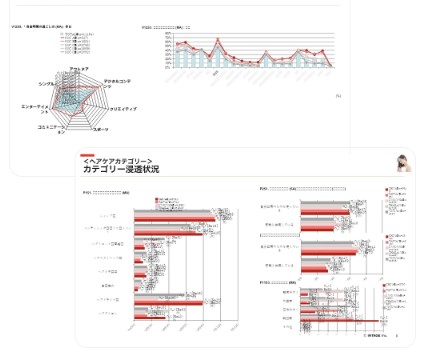
(1) What kind of life do you want to live?
First, this survey explores what kind of life people want to live.
A trend emerging from the results shows that countries with lower GDP per capita tend to have a higher proportion of respondents who answered they want a “stimulating life.”
While Generation Z is generally described as ‘practical’ and “seeking stability,” the results for the developed nations of Singapore and Hong Kong matched this image. On the other hand, in the other seven countries (excluding Vietnam), Generation Z showed a stronger tendency than the preceding Generation Y to seek “exciting lives.”
In other words, it became clear that in 7 out of 10 countries, Generation Z desires “exciting lives filled with change and challenges over stability” more than other generations.

(2)Would you rather live fully in the present than worry about the future?
When examining whether to “work hard for the future or prioritize living fully in the present,” trends diverge based on a country's per capita GDP.
In South Korea, China, Vietnam, and the Philippines, Gen Z showed a higher proportion than Gen X and Gen Y who want to “live fully in the present.” Conversely, Gen Z in the top GDP countries excluding South Korea (Singapore, Hong Kong, Taiwan) demonstrated a stronger desire than other generations to “prepare and invest for the future.”
In other words, a contrasting trend emerges: future-oriented thinking is stronger among Generation Z in developed countries, while the desire to “enjoy the present” is more pronounced among Generation Z in near-developed and developing countries.

(3) What are your values regarding material possessions?
Next, we surveyed values regarding the desire to own things.
While Generation Z is often perceived as “not materialistic,” in four East Asian countries (Hong Kong, South Korea, Taiwan, China) and the Philippines, a higher percentage of Gen Z respondents than the preceding Generation X and Y generations considered “owning things important.” Notably, this tendency weakens in countries with higher per capita GDP.

(4) Prioritizing one's own thoughts versus others' thoughts
This survey analyzed whether individuals prioritize their own opinions or those of others.
While Generation Z is often perceived as “valuing subjectivity,” this is not necessarily the case across East Asia. In countries with higher GDP, the proportion valuing subjectivity is lower, and Generation Z in Singapore and Hong Kong tends to make judgments more objectively than Generation Y. Conversely, a strong emphasis on subjectivity is observed from China to the Philippines.

(5) Generation Z Values (Country Comparison)
Looking back at previous surveys, countries with higher per capita GDP tend to show lower overall scores for Generation Z's four core values. However, the rate of decline varies. While “future-oriented thinking” and “objective judgment” drop significantly as countries move from mid-tier to top-tier, “thrill-seeking” and “desire for material possessions” decline more gradually, with smaller differences between top and bottom countries.
Although Generation Z is often described as “less materialistic,” the reality is that the desire for ownership tends to be higher in countries with lower GDP. Based on these trends, looking to Generation Z in high-income countries might offer some insight into how these values could evolve in the future.
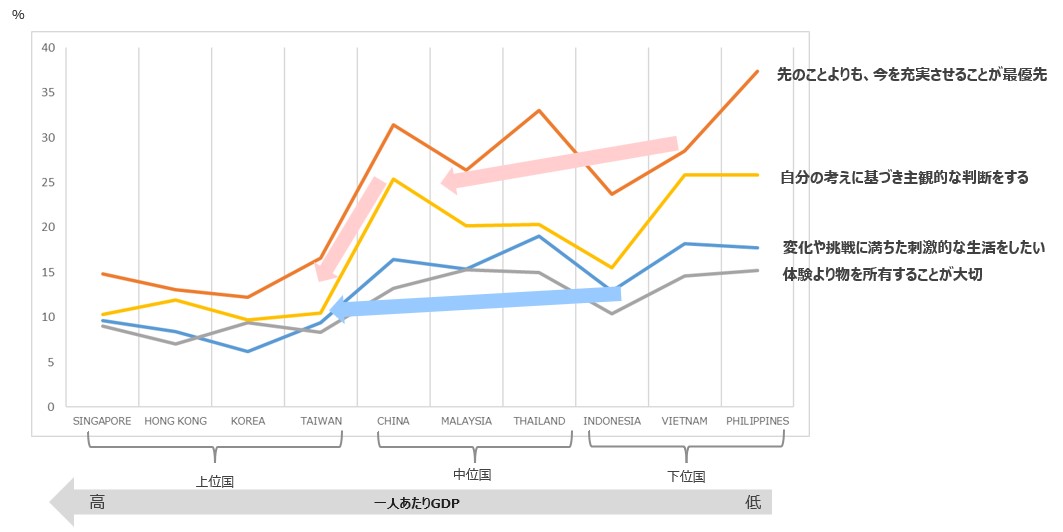
3. Generation Z's Awareness of Their Surroundings
From here, we'll look at how Generation Z thinks and acts in their daily lives regarding the environment, health, shopping, and other areas.
(1) My financial situation one year from now
First, a survey on perceptions of one's financial situation one year from now.
Generation Z in countries other than Singapore—perhaps influenced by their nations' growth rates—tend to believe their situation will “improve” more strongly than other generations, appearing relatively optimistic about the future.

(2) Your Approach to Your Own Health
Next, we examined attitudes toward personal health.
Countries with higher GDP per capita tend to have longer life expectancies, yet their health consciousness scores decline. South Korea, in particular, stands out for its low health consciousness across nearly all metrics. This may be because top-ranked countries with advanced medical infrastructure provide environments where individuals can live comfortably without strong personal health awareness.
In other words, we see an inverse relationship: “Higher GDP = longer life expectancy but lower health consciousness.” However, when comparing generations, Generation Z tends to prioritize health more than other generations, revealing a pattern distinct from the national average.

There used to be a perception that zero-sugar and zero-calorie products didn't taste good, but thanks to corporate efforts in recent years, their flavor has become well-received. Beyond soft drinks, various products like alcoholic beverages and energy drinks have been released and are attracting attention.
Related Article: [Gen Z Across Asia] South Korea's Gen Z: Managing Health Easily and Enjoyably
South Korean Gen Z women show a stronger tendency than those in other countries to prioritize the “taste and flavor” of snacks while also demanding “low calories.” Simply being a health-conscious product isn't enough; it must balance deliciousness and healthiness to gain support.

(3) Environmental Philosophy
What about so-called eco-consciousness regarding the environment?
Countries with mid-to-low per capita GDP tend to have higher eco-consciousness, with this tendency increasing as GDP decreases. While developed nations are often perceived as having high environmental awareness, this is not necessarily the case. However, Singapore—the country with the highest GDP among those surveyed—stands out: its Generation Z population actively “strives to reduce waste” and shows high favorability toward brands engaged in environmental activities.
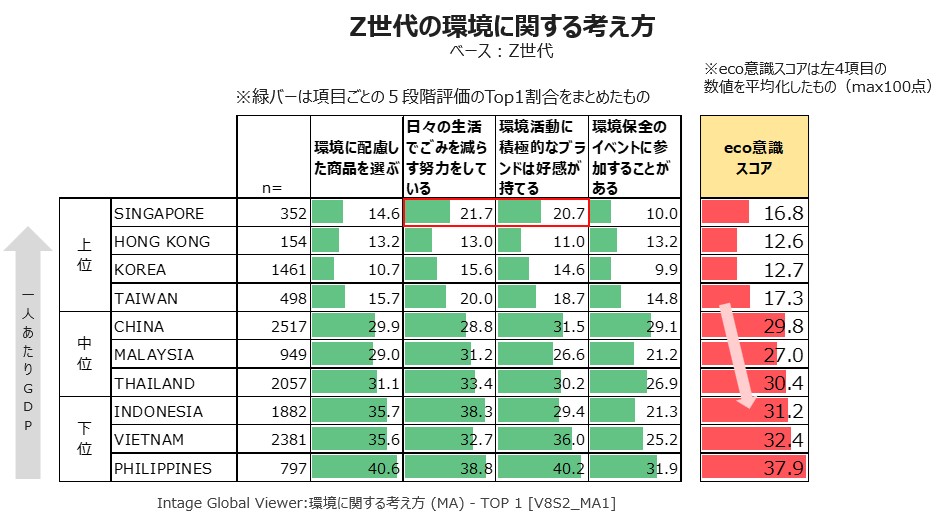
As a trend related to eco-consciousness, vegan cosmetics are gaining attention. The reasons for choosing them go beyond just heightened awareness of ethics and environmental considerations; a major factor is that choosing them is itself “stylish” and gives a sense of being on-trend. Brands that successfully tap into this consumer psychology of Generation Z are succeeding. It's becoming crucial to combine not just “high awareness,” but also “stylish, desirable elements.”
Related Article:[Asia's Generation Z] Health- and Environment-Conscious Vietnamese Gen Z ~ The Rising Trend of “Vegan Cosmetics” ~
Vietnamese Gen Z women show high interest in beauty and health, driving attention toward vegan cosmetics. When selecting products, they prioritize ingredients, efficacy, and safety over brand name, partly due to wariness of counterfeit goods. Vegan cosmetics are supported not only for environmental and ethical reasons but also as “stylish and trendy,” driving market expansion by both domestic and international brands. Alongside the growing awareness of sustainable consumption, this sector is expected to continue its growth.

(4) Approach to Shopping
Next, we surveyed attitudes toward shopping.
Countries with lower per capita GDP tend to have stronger shopping-related attitudes, showing greater enthusiasm for new items and a tendency to reference others' opinions. Conversely, in countries with higher GDP (excluding Singapore), the emphasis on novelty and word-of-mouth diminishes, and purchasing behavior becomes less cautious.
In developed countries, where low-quality products are scarce and the environment is less prone to failure, the need to consciously choose is considered lower. Notably, Indonesia stands out among lower-income countries for placing less emphasis on others' opinions.
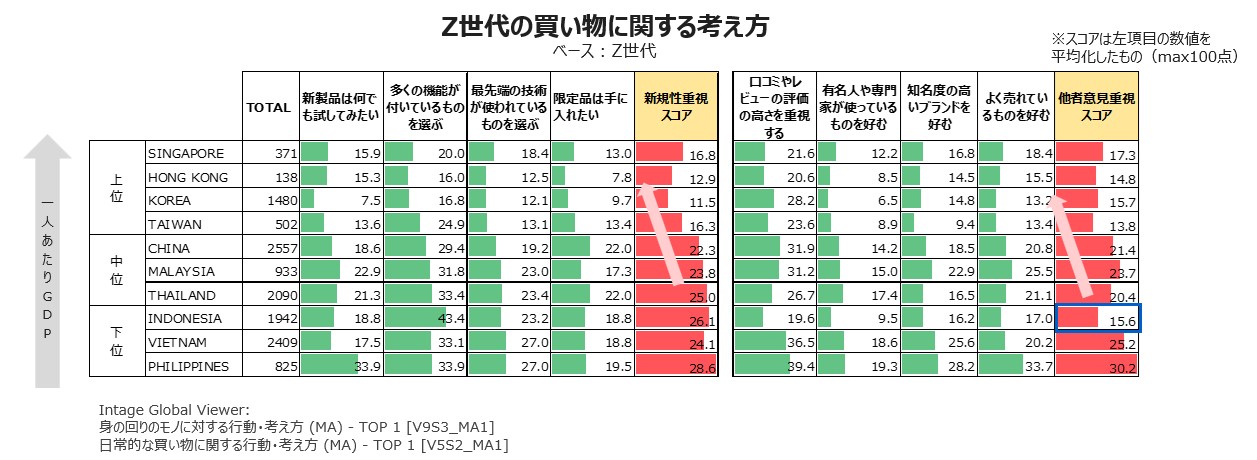
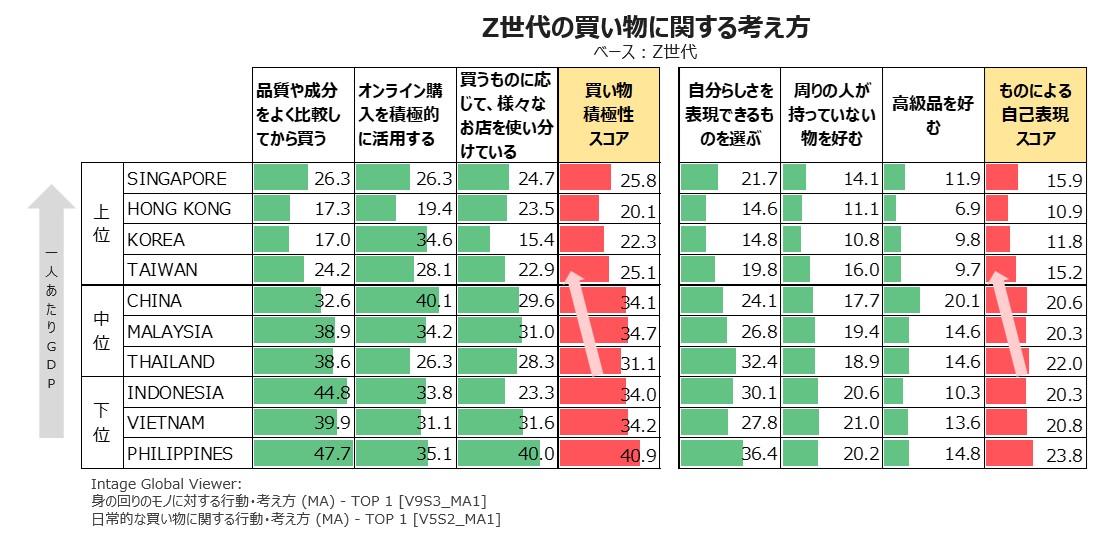
(5) Comparison of Generation Z and Generation Y
Finally, a comparison between Generation Z and Generation Y.
Previous surveys showed that countries with higher GDP per capita tended to have lower levels of awareness across the board. This suggests that in top-ranking countries, where markets are mature and consumer choices are abundant, awareness levels decline.
However, a closer look reveals that Gen Z in South Korea and Taiwan actually exhibit higher levels of awareness than Gen Y. This means we cannot simply conclude that “high GDP = low Gen Z awareness.” In fact, excluding Singapore and Hong Kong, we observed cases where Gen Z demonstrated higher awareness levels than Gen Y.
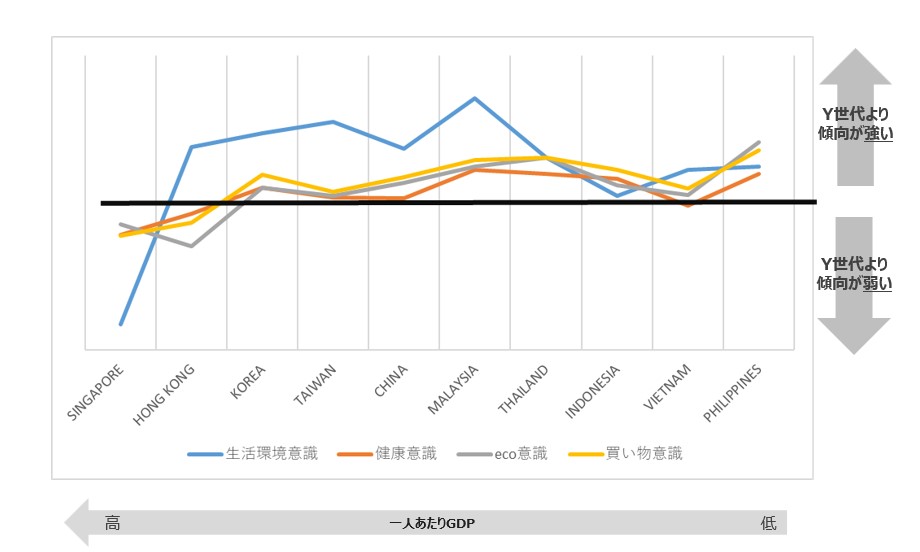
4. Summary
This time, we analyzed data on various values and attitudes among Generation Z across 10 countries. While some aspects align with common perceptions, many unexpected trends also emerged. Comparing countries revealed differences in the strength of Generation Z's values and attitudes across each nation.
When developing marketing strategies, it's crucial to understand each country's unique characteristics and design appeal points that resonate with local Generation Z—moving beyond a simple global strategy.
-

Editor profile
Chew Fong-Tat
Malaysian researcher who has lived in Japan for 14 years and has handled many surveys on ASEAN countries.
 Global Market Surfer
Global Market Surfer CLP
CLP
